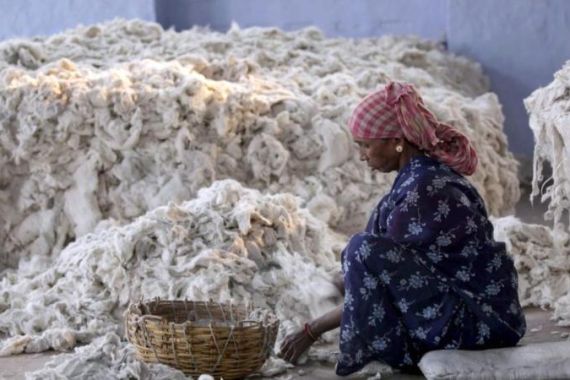Dirty white gold
Monsanto’s claim that it’s a “sustainable agriculture company” doesn’t hold water.

The website of US-based biotech giant Monsanto boasts that the corporation qualifies as “a sustainable agriculture company”.
Given Monsanto’s legacy as a producer of the lethal defoliant Agent Orange during the Vietnam War, Southeast Asian agriculture would presumably beg to differ with this characterisation.
Keep reading
list of 4 itemsTurtles swimming to extinction in Malaysia as male hatchlings feel heat
Could shipping containers be the answer to Ghana’s housing crisis?
Thousands protest against over-tourism in Spain’s Canary Islands
Sustainability is also not the first word that comes to mind when contemplating Monsanto’s policy of sowing the earth with genetically modified seeds that destroy soil and are designed with nonrenewable traits so as to require constant repurchase as well as acquisition of a variety of other company products like fertilizers and pesticides.
Nor would the term appear to define a situation in which nearly 300,000 Indian farmers have committed suicide since 1995 after being driven into insurmountable debt by neoliberal economics and the conquest of Indian farmland by Monsanto’s Bacillus thuringiensis (Bt) cotton.
| Farmers’ suicide spikes in India |
In tragic irony, many kill themselves by imbibing pesticides intended for their crops.
As for Monsanto’s shameless claim that one of its primary objectives is “to improve lives”, we might similarly conclude that butchers aim to improve the lives of cows and pigs and that two plus two is 86.
Suicide economy
Writing in 2009, physicist and author Vandana Shiva outlined Monsanto’s contributions to a “suicide economy” in India, such as an increase in the price per kilogram of cotton seeds from 7 to 17,000 rupees. Shiva lists additional complications:
“Indigenous cotton varieties can be intercropped with food crops. Bt-cotton can only be grown as a monoculture. Indigenous cotton is rain fed. Bt-cotton needs irrigation. Indigenous varieties are pest resistant. Bt-cotton, even though promoted as resistant to the bollworm, has created new pests, and to control these new pests, farmers are using 13 times more pesticides then they were using prior to introduction of Bt-cotton. And finally, Monsanto sells its GMO seeds on fraudulent claims of yields of 1500/kg/year when farmers harvest 300-400 kg/year on an average.”
There are a couple of reasons why mass farmer suicides have not generated the international attention that should ostensibly accompany such a phenomenon. For one thing, the image of desperate peasants killing themselves by the hundreds of thousands does not mesh particularly well with the portrait of India fabricated by free market pundits, who hallucinate rampant upward economic mobility among the country’s citizens thanks to globalisation.
|
“The humanisation campaign consists not only of conveying the personal stories of Indian farming families but also pinpointing the direct link between those of us who buy certain clothes and those of us who perish in the clothes-making process.” |
According to filmmaker Leah Borromeo, director of the forthcoming Dirty White Gold about cotton and fashion, the dearth of international concern over the issue is also a result of the fact that “people haven’t made the connection between our consumer habits and the lives and deaths of farmers”.
The objective of the film, which shines a light on the entire cotton supply chain, is to help force legislation that will “make ethics and sustainability the norm in the fashion industry”. As Borromeo wrote in a recent article for the New Statesman:
“I’m exploring science and the idea of open-sourcing technology to take power away from corporations and anyone who makes a killing out of suicides.”
Borromeo’s definition of ethics and sustainability – which includes providing living wages to farmers and factory workers and preventing the destruction of ecosystems – is far more persuasive than Monsanto’s definition of sustainable agriculture.
Engineering humanity
The very practice of tinkering with the genetic makeup of seeds in ways detrimental to consumers and the environment alike underscores the total estrangement of Monsanto and similar outfits from life itself.
How, then, does one go about injecting humanity into a system that systematically expunges it?
As Borromeo has explained, one of her primary tasks in Dirty White Gold is to combat the dehumanisation of “the Other” – an age-old tradition that has in contemporary times handily justified civilian slaughter in Arab/Muslim lands and helped ensure that thousands upon thousands of dead Indian farmers remain nothing more than an emotionally neutral statistic.
The humanisation campaign consists not only of conveying the personal stories of Indian farming families but also pinpointing the direct link between those of us who buy certain clothes and those of us who perish in the clothes-making process.
By linking individual narratives to relevant narratives of activism, meanwhile, Borromeo demands more than a bout of feel-good sympathy from viewers. As she remarked in an interview with Urban Times:
“I wanted to take an approach that wasn’t, to borrow a phrase from [filmmaker] Adam Curtis, ‘oh-dearism’, which is when people watch a documentary, see all the misery and say, ‘Oh dear, isn’t that awful?’, and then do nothing. I wanted this film to be the antithesis of oh-dearism – for them to think, ‘Isn’t this awful… but here’s what I can do about it, this is how we can change it’.”
Borromeo’s film constitutes a thoughtful and self-critical exploration of options for revising operating structures in the cotton and fashion industries via the elimination of corporate middlemen and promotion of direct trade. A vital antidote, no doubt, to the cheery optimism exuded by Monsanto as it poisons the earth and mankind.
Belen Fernandez is the author of The Imperial Messenger: Thomas Friedman at Work, released by Verso in 2011. She is a member of the Jacobin Magazine editorial board, and her articles have appeared in the London Review of Books blog, Al Akhbar English and many other publications.
